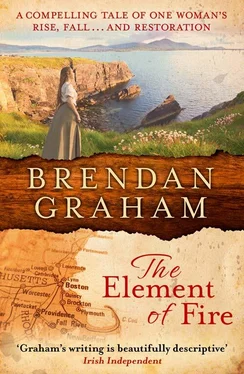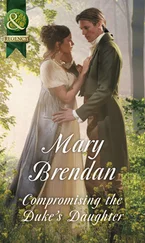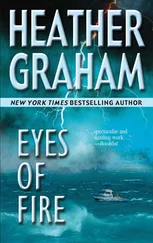BRENDAN GRAHAM
The Element of Fire

HarperCollins Publishers The News Building 1 London Bridge Street London SE1 9GF
www.harpercollins.co.uk
This edition 2016
First published in Great Britain by
HarperCollins Publishers 2001
Copyright © Brendan Graham 2001
Brendan Graham asserts the moral right to be identified as the author of this work
Although this work is partly based on real historical events, the main characters portrayed therein are entirely the work of the author’s imagination.
Fair-Haired Boy - Words and Music by Brendan Graham © Brendan Graham (world exc. Eire) / Peermusic (UK) Ltd. (Eire)
All rights reserved under International and Pan-American Copyright Conventions. By payment of the required fees, you have been granted the nonexclusive, nontransferable right to access and read the text of this e-book on-screen. No part of this text may be reproduced, transmitted, downloaded, decompiled, reverse engineered, or stored in or introduced into any information storage and retrieval system, in any form or by any means, whether electronic or mechanical, now known or hereinafter invented, without the express written permission of HarperCollins e-books.
HarperCollins Publishers has made every reasonable effort to ensure that any picture content and written content in this ebook has been included or removed in accordance with the contractual and technological constraints in operation at the time of publication.
Source ISBN: 9780006513964
Ebook Edition © FEBRUARY 2016 ISBN: 9780007401109
Version: 2016-01-19
Dedicated to the memory of
‘The Coot’,
Fr. Henry Flanagan O.P., Newbridge College
(1918–1992)
Sculptor, musician, teacher, friend
Cover
Title Page
Copyright
Dedication
1
2
3
4
5
6
7
8
9
10
11
12
13
14
15
16
17
18
19
20
21
22
23
24
25
26
27
28
29
30
31
32
33
34
35
36
37
38
39
40
41
42
43
44
45
46
47
48
49
50
51
52
53
54
55
56
57
58
59
60
61
Keep Reading
Recommended Reading
Acknowledgements
About the Author
Praise
Also by the Author
About the Publisher
‘The element of fire is quite put out;
The sun is lost, and th’ earth …’
‘An Anatomy of the World’
JOHN DONNE (1572–1631)
1848 – Ireland
It was a grand day for a funeral.
A grand August day, Faherty thought.
The coachman, a thin, normally talkative fellow, with a tic in his left eye, held back now. Cap in hand, he waited, a respectful distance from the graveside.
He had brought them here, deep into the mountains and lakes of this remote Maamtrasna valley. The red-haired woman, her twin daughters, one dead, one alive; the son, and the orphan waif, silent as a prayer, beside him.
The silent one was a mystery to him. A week ago – the first time he had brought the woman back here from the ship at Westport – the girl had appeared out of nowhere and attached herself to them, running near naked alongside his carriage for miles. Not a word out of her mouth, not even begging.
He wouldn’t have stopped if it hadn’t been for the woman. She had taken pity on the girl, saved her from almost certain death. Since then, all through the last few days, she had been like a shadow to the woman, quiet as a nun. God knows, he decided, seeing the woman kneeling over the grave – settling into it the tiny white flowers of the potato plant – someone would want to watch over her. It was surely a strange thing to do – potato flowers on a grave. The way she ran down from the hillock here. Ran, barefooted to the bare-acred field, on past the tumbled cabins and, like that, snatched up a fistful of the flowers from the derelict potato beds. Before that the child’s shawl – ‘Annie’s shawl’, she called it – must be another one she lost – twined it round the hands of the little dead one, like rosary beads.
Now her fine, emerald-green American dress was ruined with kneeling in the clay, but she didn’t seem to notice. Just kept repeating the child’s name over and over: ‘Katie! Katie! Oh, Katie a stór !’ Faherty wondered what she had been doing beyond in America, with her three children here? Not knowing whether they were dead or alive. He watched the shape of her stretch backwards. She was hardly the thirty years out – a fine woman. He turned his head slightly, so as not to be watching her that way.
Out of the corner of his good right eye, he glanced back along the curl of the valley, with its lake of green glistening islands. There wasn’t much here for her – a few patches of hungry grass. Not a beast in a field. Hard to get a morsel of food out of a place like this – even before the potato rot. Nothing but rocks and stones and water everywhere, as Faherty saw it.
The sun was bothering him, causing his left eye to jump even more.
Hard on her though, sailing all this way to find them, and then one of them up and dying, just when she thought she had them safe. Hard on the little one left too – she must be only the nine or ten years, same as the other little one they were burying. A split pair they were – one taken, one left behind, the two of them the spit of the mother, hair like it was spun out of hers.
The boy was a biteen older, maybe two or three years. Distant from the mother – for leaving them, Faherty supposed. Didn’t look like her either, dark, must have taken after the father. But then, what else could the woman have done? Her husband already put into this spot and their cabin thrown down. What had she left here, only the gossoors and no way of supporting them? The boy would understand in time – give him a few years, and a few knocks in life. He’d understand all right. Still, it must have been hard.
The woman was straightening, dusting down her dress, wiping the earth from her feet, readying to go. She was tall, for a woman. His eye, practised for horse flesh, put her at seventeen hands, maybe even the seventeen and a half. A hand or two above his own five feet four inches. A fine ainnir of a woman. She wouldn’t wait a widow long, Faherty thought. He crossed himself, slid on his cap again, fell in behind the silent girl as they descended the burial place, the same as they’d come up, in single file, the boy leading. Next, the living twin, followed by the mother, then the girl and himself.
It was a strange thing the way, when they had set out on the journey here … the way she had carried the child, not letting on at first that she was dead at all, just bad with the fever. He supposed the woman had her reasons. In case they’d take the girl from her, throw her into the lime pit, maybe. Faherty didn’t know what in God’s name she wanted to be hauling all the way out here for, to this wild place, making a thing of it. Sure, weren’t people dying like flies on every side, on account of the Famine, half of them getting no right burial at all. Faherty was well used to death by now. When you were dead, you were dead. She could have buried the child back in Westport, in the Rocky, and saved them all this trouble. The Rocky, if it was a quarry, was consecrated to take the fevered dead. Sure, wasn’t half the countryside already flung into it!
Читать дальше













